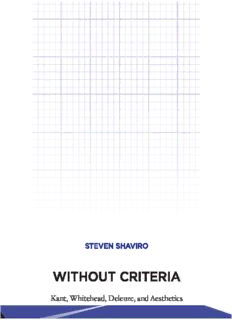
Without Criteria: Kant, Whitehead, Deleuze, and Aesthetics PDF
Preview Without Criteria: Kant, Whitehead, Deleuze, and Aesthetics
Kant, Whitehead, Deleuze, and Aesthetics Without Criteria Technologies of Lived Abstraction Brian Massumi and Erin Manning, editors Relationscapes: Movement, Art, Philosophy, Erin Manning, 2009 Without Criteria: Kant, Whitehead, Deleuze, and Aesthetics, Steven Shaviro, 2009 Without Criteria: Kant, Whitehead, Deleuze, and Aesthetics Steven Shaviro The MIT Press Cambridge, Massachusetts London, England © 2009 Massachusetts Institute of Technology All rights reserved. No part of this book may be reproduced in any form by any electronic or mechanical means (including photocopying, recording, or information storage and retrieval) without permission in writing from the publisher. For information about special quantity discounts, please email [email protected] This book was set in Garamond and Rotis semi-sans by Binghamton Valley Composition in Quark. Printed and bound in the United States of America. Library of Congress Cataloging-in-Publication Data Shaviro, Steven. Without criteria : Kant, Whitehead, Deleuze, and aesthetics / Steven Shaviro. p. cm. Includes bibliographical references. ISBN 978-0-262-19576-8 (hardcover : alk. paper) 1. Whitehead, Alfred North, 1861–1947. 2. Aesthetics. 3. Deleuze, Gilles, 1925–1995. 4. Heidegger, Martin, 1889–1976. 5. Kant, Immanuel, 1724–1804. I. Title. B1674.W354S44 2009 192—dc22 2008041142 10 9 8 7 6 5 4 3 2 1 Contents Series Foreword vii Preface: A Philosophical Fantasy ix 1 Without Criteria 1 2 Actual Entities and Eternal Objects 17 3 Pulses of Emotion 47 4 Interstitial Life 71 5 God, or The Body without Organs 99 6 Consequences 143 References 163 Index 171 Technologies of Lived Abstraction Erin Manning and Brian Massumi, editors “What moves as a body, returns as the movement of thought.” Of subjectivity (in its nascent state) Of the social (in its mutant state) Of the environment (at the point it can be reinvented) “A process set up anywhere reverberates everywhere.” The Technologies of Lived Abstraction book series is dedicated to works of transdisciplinary reach inquiring critically but especially creatively into pro- cesses of subjective, social, and ethical-political emergence abroad in the world today. Thought and body, abstract and concrete, local and global, individual and collective: the works presented are not content to rest with the habitual di- visions. They explore how these facets come formatively, reverberatively to- gether, if only to form the movement by which they come again to differ. Possible paradigms are many: autonomization, relation; emergence, complexity, process; individuation, (auto)poiesis; direct perception, embodied perception, perception-as-action; speculative pragmatism, speculative realism, radical empiricism; mediation, virtualization; ecology of practices, media ecology; technicity; micropolitics, biopolitics, ontopower. Yet there will be a common aim: to catch new thought and action dawning, at a creative cross- ing. The Technologies of Lived Abstraction series orients to the creativity at this crossing, in virtue of which life everywhere can be considered germinally aesthetic, and the aesthetic anywhere already political. “Concepts must be experienced. They are lived.” Preface: A Philosophical Fantasy This book originated out of a philosophical fantasy. I imagine a world in which Whitehead takes the place of Heidegger. Think of how important Hei- degger has been for thinking and critical reflection over the past sixty years. What if Whitehead, instead of Heidegger, had set the agenda for postmodern thought? What would philosophy be like today? What different questions might we be asking? What different perspectives might we be viewing the world from? The parallels between Heidegger and Whitehead are striking. Being and Timewas published in 1927, Process and Realityin 1929. Two enormous phi- losophy books, almost exact contemporaries. Both books respond magisteri- ally to the situation (I’d rather not say the crisis) of modernity, the immensity of scientific and technological change, the dissolution of old certainties, the increasingly fast pace of life, the massive reorganizations that followed the horrors of World War I. Both books take for granted the inexistence of foun- dations, not even fixating on them as missing, but simply going on without concern over their absence. Both books are antiessentialist and antipositivist, both of them are actively engaged in working out new ways to think, new ways to do philosophy, new ways to exercise the faculty of wonder. And yet how different these two books are: in concepts, in method, in affect, and in spirit. I’d like to go through a series of philosophical questions and make a series of (admittedly tendentious) comparisons, in order to spell out these differences as clearly as possible. 1The question of beginnings Where does one start in philosophy? Heidegger asks the question of Being: “Why is there something, rather than nothing?” But Whitehead is splendidly indifferent to this question. He asks, instead: “How is it that there is always something new?” Whitehead doesn’t see any point in returning to our ultimate beginnings. He is interested in creation
Description: